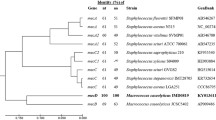Abstract
Two clinical strains of Pasteurella multocida were isolated from an HIV-infected patient who developed arthritis. Strain FB-1, which was isolated from a dog-bite wound, was resistant to narrow-spectrum penicillins. The second strain, FB-2, which was present in blood cultures as well as the dog-bite wound, was susceptible to all β-lactam agents. Arbitrarily primed-polymerase chain reaction and pulsed-field gel electrophoresis revealed that these two isolates were genetically indistinguishable. 16S rDNA gene sequencing facilitated identification at the subspecies level. Amoxicillin resistance determinant was located on a highly unstable 4.3-kb plasmid, pFAB-1. Isoelectrofocusing and polymerase chain reaction amplification followed by sequencing revealed the presence of a pI 5.4 TEM-1 β-lactamase. This description is the first of a TEM-1 Beta-lactamase in a Pasteurella multocida strain of human origin.
Similar content being viewed by others
Author information
Authors and Affiliations
Rights and permissions
About this article
Cite this article
Naas, T., Benaoudia, F., Lebrun, L. et al. Molecular Identification of TEM-1 β-Lactamase in a Pasteurella multocida Isolate of Human Origin. EJCMID 20, 210–213 (2001). https://doi.org/10.1007/PL00011254
Issue Date:
DOI: https://doi.org/10.1007/PL00011254




